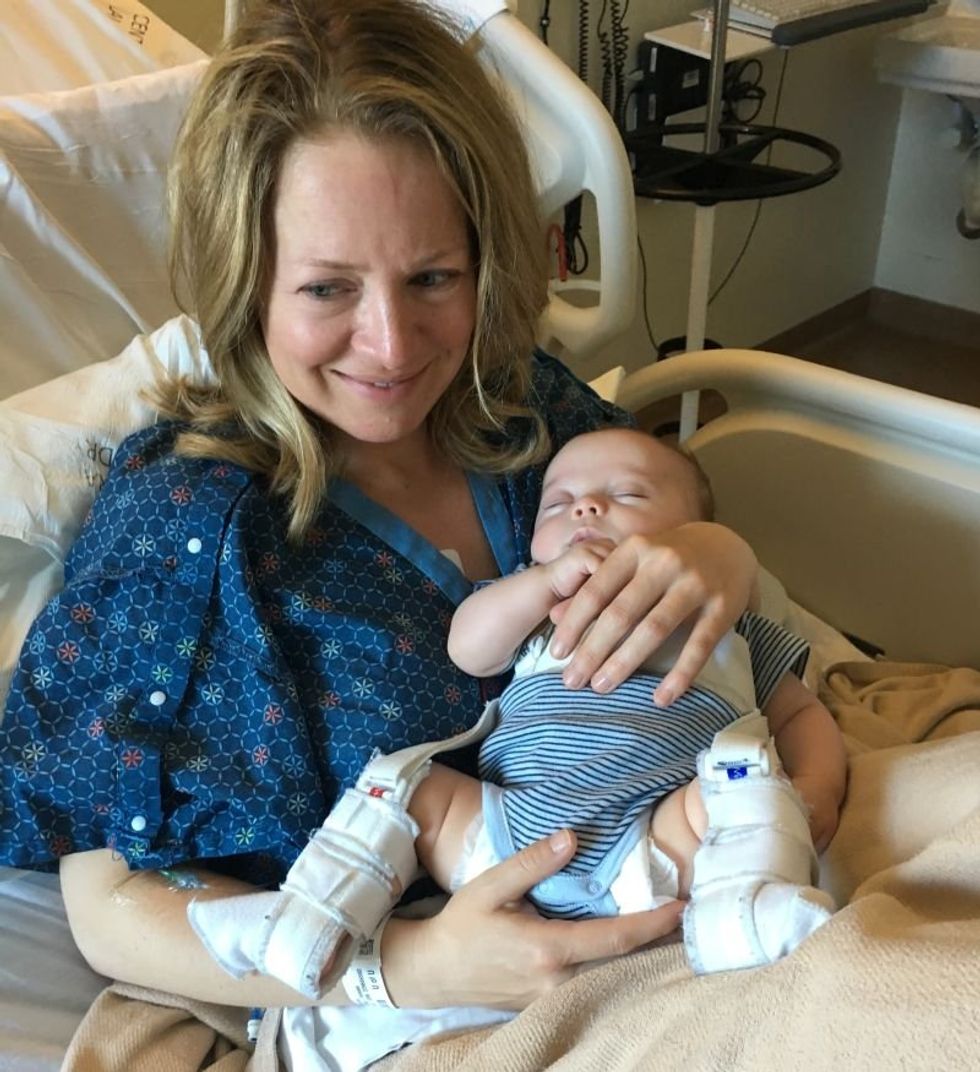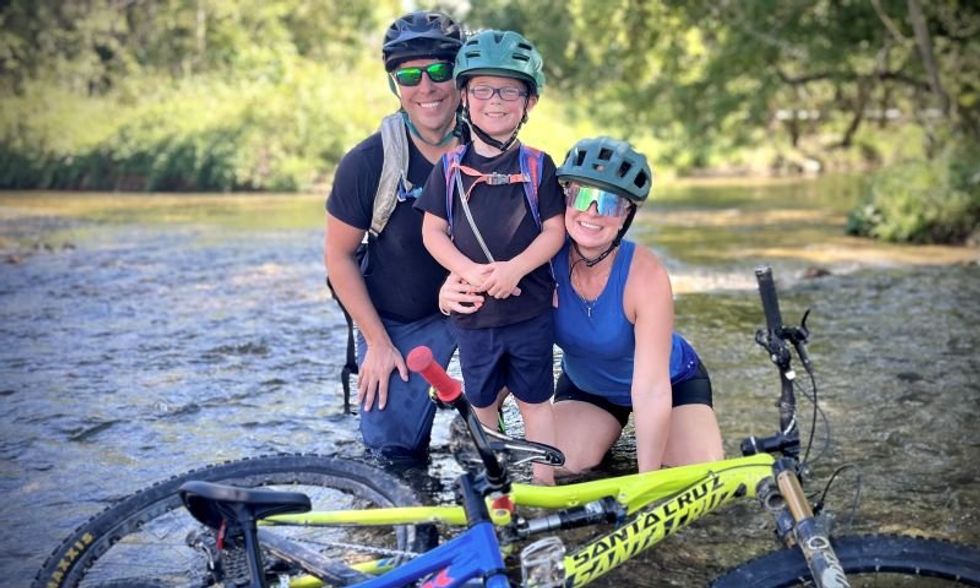As told to Jacquelyne Froeber
May is Stroke Awareness Month.
“Why is my face numb?”
As I stared at myself in the mirror, everything looked fine to me. But the left side of my face definitely felt numb. Then I remembered that the tip of my tongue felt numb the day before.
Alarm bells started going off in my head. Was there something wrong with me?
I knew I was juggling a lot as a first-time mom, but I’d been feeling great up until that point. I’d had a speedy recovery after my C-section, and I was excited for my second day back at work. I felt like I had my life figured out.
So, I convinced myself that the numbness was no big deal. I’d probably slept hard on my left side near the baby monitor. And I probably burned my tongue on one of the many cups of coffee I’d been drinking to feel less tired.
Days went by but the numbness stayed, and the fatigue got worse. I ran into a friend who’s a physician assistant and told him how I was feeling. “Do you think it’s Bell’s palsy?” I asked.
“Maybe … but get it checked out,” he said.
I frowned. “What else could it be? I didn’t have a strokeor anything.” That was the only thing I could think of that was associated with numbness.
He agreed that I didn’t look like I had a stroke, but thought I should still see my primary care doctor. Luckily, I was able to get in to see her that day. She said I could have Bell’s palsy, but I needed to go to emergency care to be sure.
I tried to reason with her. I had work, a newborn at my neighbor’s house, and my husband was out of town — did I really need to go to the ER?
She said yes.
Two imaging tests later, the ER doctor said he thought I’d had a stroke, but they needed more testing to be sure.
I was stunned.
I’d joked about it before, but a stroke just didn’t seem possible. My face wasn’t drooping, and I didn’t have slurred speech. I was a healthy, active, 36-year-old mom who just had a wonderfully boring, uncomplicated birth. How was this happening to me?
I was taken to the neuro unit of the hospital where a nurse asked if I needed a breast pump. I noted there were a lot of pumps on the shelf behind her. “You wouldn’t believe how many new moms we get in here,” she said.
 Jess holding her son, Stanley, in the hospital after her stroke in 2019.
Jess holding her son, Stanley, in the hospital after her stroke in 2019.
I thought that was odd but later learned that your body goes into a hypercoagulable state after giving birth, which means your blood is more likely to clot and you’re at an increased risk for stroke.
This blew my mind. I’d been worried about 1,000 different things after having my son, but no one mentioned the increased possibility of a stroke.
The next day the tests confirmed that I did, in fact, have a stroke in my brain stem. My hypercoagulable state could’ve caused it, but no one knew for sure.
My doctor said I’d probably be fine. He prescribed me some medication and I went home. No one seemed to think it was that big of a deal, so I figured the worst was behind me.
Three days later, I woke up in bed staring at two ceiling fans. We only have one. For about 30 minutes, I tried to focus my eyes to make one fan, but I just couldn’t do it. I stumbled my way down the stairs and told my husband we needed to go back to the ER.
After more tests, the good news was that I wasn’t showing evidence of any new strokes. The bad news: No one knew what was causing my double vision. I was prescribed another medication and went back home disoriented and scared.
Unfortunately, the medication didn’t help. As disturbing as the double vision was, the fatigue was even worse. I felt like I was being weighed down by a thick fog that never lifted. The tiredness had become my new normal, so I did my best to push through the fatigue and stay as active as possible. I knew taking care of my physical health could only help in the long run.
 Jess with her husband and son, Stanley.
Jess with her husband and son, Stanley.
After two months, I did start to feel better. I had more energy and my vision was almost back to normal. But the relief was short-lived. I started having episodes where I’d lose command of my lips or tongue or my left arm or leg. The loss of motor skill only lasted about 30 seconds — but each time it felt like an eternity. I never knew when an episode would happen, but they were so frequent that I got good at hiding them.
I knew the whole situation was bizarre. Typically, people who’ve had a stroke show progress over time — I had a whole new set of symptoms. And no one could tell me what was going on.
Finally, I did find a doctor who said I was having episodes because my brain wasn’t getting enough blood. He said if we could slow or prevent the blood from clotting, the episodes would stop after about six months.
For the next half of the year, I took a new medication and tried to be patient with myself. It wasn’t easy. Every morning I woke up scared that I’d see two ceiling fans. And every time I had an episode, I feared I wouldn’t come out of it. Then, around the six-month mark, the episodes stopped. And they didn’t come back.
Over the years, I’ve been surprised by the amount of people who either know someone who’s had a postpartum stroke or had one themselves. I wish I’d known about the increased risk — maybe I wouldn’t have shrugged off the fatigue and numbness for as long as I did.
After my episodes stopped, I was good for a long time. But in 2021, I started experiencing trigeminal neuralgia, searing pain on the left side of my face — similar to where I had the numbness with the stroke. In the beginning, the pain would come and go, but as of today, it’s been more than a year of constant, unrelenting pain.
I think the pain is somehow connected to the stroke, but the doctors aren’t sure why it’s happening or how to treat the pain. It’s been a frustrating and time-consuming process, and some days the pain is so overwhelming I feel hopeless. But I know I have to keep pushing to find the help I need. Just because I haven’t found it yet — doesn’t mean it’s not out there.
Have your own Real Women, Real Stories you want to share? Let us know.
Our Real Women, Real Stories are the authentic experiences of real-life women. The views, opinions and experiences shared in these stories are not endorsed by HealthyWomen and do not necessarily reflect the official policy or position of HealthyWomen.
From Your Site Articles
Related Articles Around the Web




